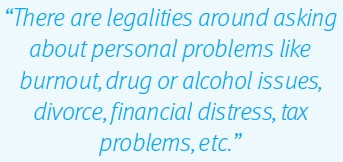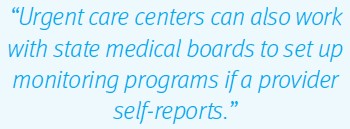Published on
Benjamin Barlow, MD; Phyllis Dobberstein, CPC, CPMA, CPCO, CEMC, CCC
The False Claims Act (FCA) is a federal statute enacted in 1863, inspired by defense-contractor fraud during the Civil War. Today it is used to prosecute inappropriate billing in the healthcare setting. Any person who knowingly submits false claims to the government (ie, Medicare, Medicaid, and Tricare) is liable for 3 times the government’s damages plus a penalty that is linked to inflation. Penalties are per claim and can become quite expensive. In the past few years, urgent care has had settlements under the FCA totaling $44.4 million.

In 2018, an urgent care practice in New York agreed to pay $6,606,251.40 in damages. The issues were:
- Billing for lengthier and/or more complex services than were actually provided
- Billing for services performed by non-credentialed provider under a credentialed provider
In 2021, an urgent care practice in South Carolina and its management company paid $22.5 million also for billing for services rendered by non-credentialed providers under a credentialed provider.
In 2022, an urgent care practice in Connecticut settled for $4,267,950.21. The issues were:
- Billing for unnecessary allergy testing and the unsupervised preparation of allergy immunotherapy
- Billing for services as if rendered by the medical director when the director was traveling internationally
- Submitting claims for office visits when COVID-19 testing was the only service provided
In 2023, another urgent care practice in Missouri agreed to pay $9,150,794 to settle allegations of false claims. The issues were:
- Submitting claims for services performed by non-physician practitioners under a physician
- Billing for claims that were up-coded
- Billing the uninsured program during the Public Health Emergency with improper billing codes
- Paying bonuses to certain employed physicians based on the volume or value of their referrals for designated health services
These settlements seem straightforward: a claim was submitted that did not reflect the services performed. However, in January 2024, an urgent care practice in Idaho and its owners entered into a settlement for $2 million for hiring “vulnerable, compromised, and inexperienced medical staff.” These providers were allegedly pressured to write prescriptions for controlled substances that were sometimes unnecessary or unsafe. In one instance, the owners hired a nurse practitioner with alcohol and substance use disorder. Instead of cancelling appointments when the provider was too impaired to drive to the clinic safely, they sent a medical assistant to the nurse practitioner’s home to provide a ride to work.

Why is this a false claim rather than malpractice? It’s because the government was billed for worthless services. Obviously, this was a bad actor. They had a number of additional issues, including kickbacks from outside labs and giving false information to obtain government monies under the Paycheck Protection Program.
Subjective Measures
The case of the compromised nurse practitioner in Idaho does provide an additional concern when making staffing decisions, specifically that a subjective measure could be applied to a provider that is otherwise compliant with licensing and insurance requirements. One way to assess this risk is to have a standard interview process that includes questions to probe for any prior concerning behaviors. There are legalities around asking about personal problems like burnout, drug or alcohol issues, divorce, financial distress, tax problems, etc. So, it is critical that these questions are asked in a proper way with legal and human resource teams’ sign off.
If concerns are discovered for a particular candidate and the decision is made to still hire the individual, setting up a strict monitoring program is recommended. Urgent care centers can also work with state medical boards to set up monitoring programs if a provider self-reports. Often the medical board mandates these programs be in place for providers that have had past issues, and working together with the medical board can fosters a partnership.

Turnover in urgent care can be high compared to other practices, including hospital medical groups. When an urgent care is not highly selective due to staffing shortages, they run a risk of ending up with a provider who may cause downstream issues. Having a comprehensive training program and a quality review process can alleviate a lot of these concerns post-hire.
This raises the question of how a practice sets a standard to assure compliance. While the issue is beyond the scope of this article, it begins with having a knowledgeable team member with expertise in compliance and working with the clinical staff to design clear check and balances. If you aren’t measuring it, you can’t manage it.
Download the article PDF Here.
Read More
- Civil Division | The False Claims Act
- What Exactly Are Whistleblower Lawsuits—And How Can You Protect Your Urgent Care Operation?
- Building Ethical Organizations And Teams


